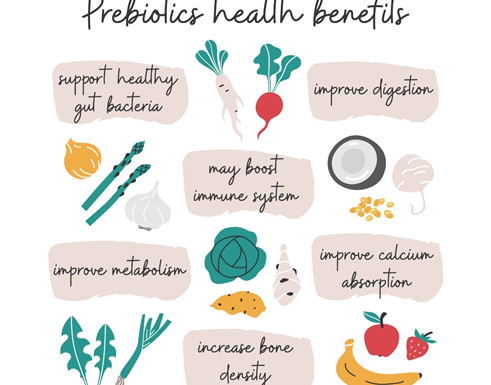
Prebiotics are non-digestible fibre that helps efficient bacteria grow in the gut and supports innate health. Probiotics are live bacteria you can find in certain foods, and the prebiotic feed sustains them to multiply and so increases their effectiveness.
This has brought bee pollen, a natural treasure gathered by bees when they visit flowers, more and more attention. There is a wide array of nutrients and bioactive substances in bee pollen, and it becomes a super food that should be included in the daily diet.
The Nutritional Value of Pollen: A Prebiotic Superfood
Pollen from bees is a nutritional maze because of its nutritional profile; it actually contains all the vitamins, minerals, and amino acids that your body needs. Besides that, it contains enzymes and antioxidants, which show it should be good for you all around.
One big benefit of pollen being high in protein is that it presents itself as an easy and efficient way to get all of the essential amino acids needed for human life. Pollen is a source of vitamins A and E. These vitamins are critical for leading off a cold, and they also keep skin in good condition.In addition, pollen is rich in B vitamins that are essential for maintaining a person’s energy mechanisms, as they can help increase the efficiency of one’s immune system.
Bee pollen also contains such minerals as magnesium, calcium, potassium, and zinc. These are all valuable aids to maintaining bone density and health. And it has minerals—rich protein.
Potential Side Effects of Consuming Bee Pollen as Prebiotic Supplements
Bee pollen allergies are common. People may feel mild to severe symptoms such as itching, swelling, hives, and, in extreme cases, anaphylactic shock when these parasite allergies hit them suddenly if they have been bitten by bees. Those who are allergic to bee stings and other bee products had better be cautious when taking bee pollen capsules, making sure to be checked by a medical professional first.
Some people find that they experience allergic reactions from bee pollen besides allergies each spring. This might show up as anything from bloating to gas or diarrhoea. It is said that you should start with small doses of pollen and keep a close eye out for any adverse effects.
How to Incorporate Bee Pollen into Your Diet for Optimal Prebiotic Health Benefits
Incorporating bee pollen Australia is a flavoursome and nutritious means of achieving these prebiotics. Here are a few simple ways that you may include bee pollen in your daily routine:
- To improve the taste and nutritional content of your favourite smoothie recipe, add one or two teaspoons of bee pollen. To make pleasant and healthy beverages, you may combine spinach leaves with fruit, plant-based milk, or yoghurt.
- Yoghurt or Cottage Cheese: Scatter the bee pollen granules on top of yoghurt or cottage cheese for a wonderful wholegrain crumbly ‘edge.’ You can also stir the bee pollen crazily into the yoghurt or cottage cheese for more flavour and texture, especially if those cheeses are runny.
- Oatmeal or Cereal: Stir bee pollen straight into your morning oatmeal or cereal for an extra shot of nutrition. With a sweet, nutty taste to balance your breakfast, of course, as well as providing prebiotics
- Salads: Sprinkle some lightly over the top before serving. It can suit almost any kind of salad, be it lettuce or fruit. It goes well with nuts and grains, fruits, salsas or vinaigrettes of all kinds—adding taste and nutrition to your salad.
- Toast or Bread: Honey or nut butters can also be lightly smeared onto toast or bread to form a thin layer, then sprinkle bee pollen over it. A tasty and nutritious snack is formed, which is also good for lunch.
- Energy Bars or Balls: With homemade energy bars and balls, bee pollen can be combined to make a convenient, nutritious snack. Mix it with nuts, dried fruits, oats, and honey or nut butter, then shape into bars or balls for a healthy on-the-go option.
- Tea or Infusions: Honey is somewhat sweet, and hot tea is very aromatic and enjoyable. It tastes a little sweet as well, which doesn’t make your water taste fizzy altogether-well-balanced beer tea!
- Baking: Foods like muffins, bread, granola bars, and cookies can be combined with bee pollen to try adding a little extra delicacy and nutrition. Just mix it into the batter or dough before baking .
Selecting High-Quality Bee Pollen Products for Best Prebiotic Efficacy
When you decide to buy bee pollen Australia, choosing high-quality resources is a must for maximum prebiotics effectiveness combined with safety.
When you choose bee pollen supplements or goods, keep the following items in mind:
- Certified Organic: If you buy organic bee pollen products, they won’t contain the pesticides and harmful chemicals that are in conventional pollen.
- Pure and Unprocessed: Bee pollen items should be as pure as possible with no additives or unnecessary treatment.
- Origins: Select bee pollen from a stable source.
- Third-Party Testing: Look for tested bee pollen products that independent bodies have found free of impurities or lacking in potency.
Conclusion
The great nutritional content of bee pollen is just beyond compare. It may help push forward your health by supporting good gut flora. Bee pollen solidifies into a very rich nutrient soup, but remember that depending on your biochemical makeup, quality can still be erratic. As prebiotics, bee pollen is a tasty little supplement that will keep you regular and sweet. Choose a high-quality product that you trust and merge it into what is already your favourite dish. Please consult medical professionals to discuss about the prebiotics supplements and the implications of changing your diet for healthcare reasons. This is especially true if you already suffer from allergies.

